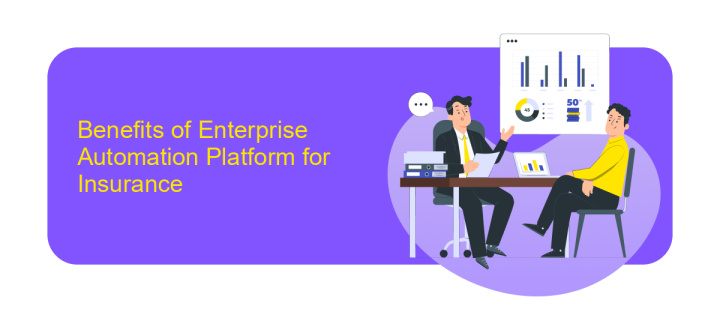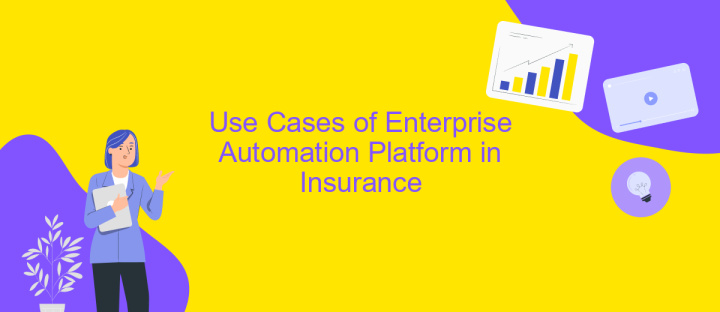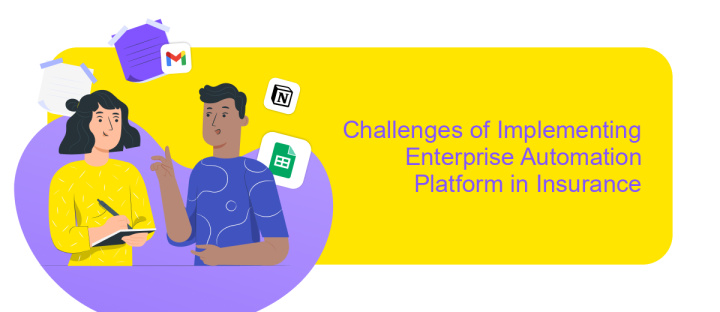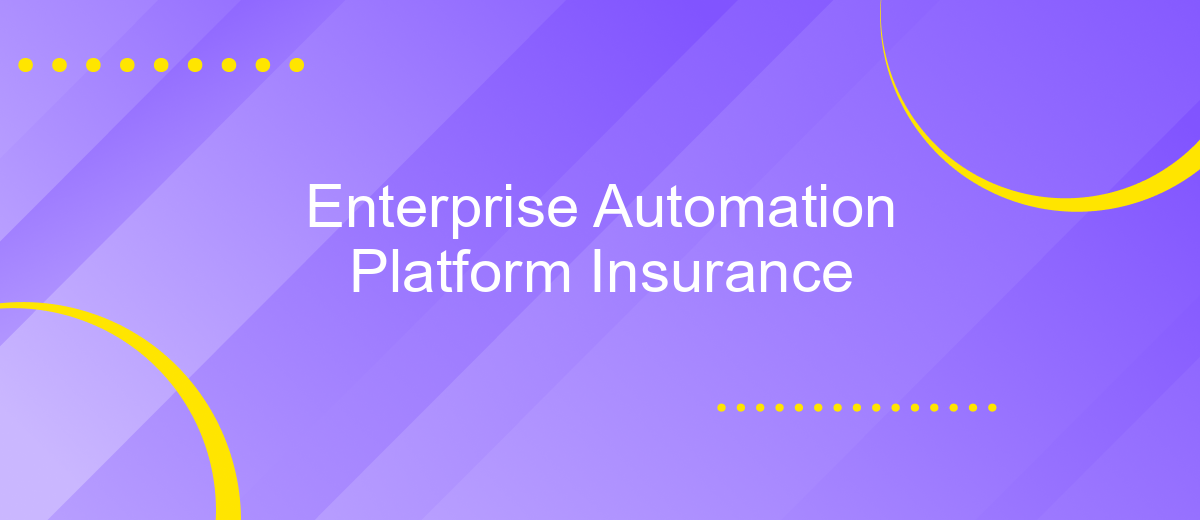Enterprise Automation Platform Insurance
In today's rapidly evolving insurance landscape, leveraging advanced technology is crucial for staying competitive. Enterprise Automation Platforms are transforming the insurance industry by streamlining operations, enhancing customer experiences, and reducing costs. These platforms integrate seamlessly with existing systems, offering scalable solutions tailored to the unique needs of insurers. This article explores the benefits and key features of Enterprise Automation Platforms in revolutionizing the insurance sector.
Introduction
In the rapidly evolving landscape of insurance, the integration of enterprise automation platforms is transforming traditional operations. These platforms are designed to streamline processes, enhance customer experience, and improve efficiency. By leveraging advanced technologies such as artificial intelligence and machine learning, insurance companies can automate repetitive tasks, reduce human error, and focus on strategic decision-making. This shift not only optimizes resources but also positions insurers to better meet the dynamic needs of their clients.
- Improved efficiency through automated workflows.
- Enhanced customer experience with personalized services.
- Reduction in operational costs and human errors.
- Data-driven insights for strategic decision-making.
Adopting an enterprise automation platform in the insurance sector is no longer a luxury but a necessity for staying competitive. As the industry faces increasing demands for transparency, speed, and accuracy, automation provides a robust solution to meet these challenges. By transforming core operations, insurers can not only enhance their service offerings but also ensure compliance with regulatory standards, ultimately driving growth and sustainability in a complex market.
Benefits of Enterprise Automation Platform for Insurance

Enterprise automation platforms offer significant advantages for the insurance industry by streamlining operations and enhancing efficiency. These platforms automate routine tasks such as claims processing, policy management, and customer service, allowing employees to focus on more strategic activities. Automation reduces human error, speeds up processing times, and ensures compliance with industry regulations, ultimately improving customer satisfaction and loyalty. Furthermore, data analytics capabilities embedded within these platforms provide insurers with valuable insights into customer behavior and risk assessment, enabling more informed decision-making.
Integrating various systems and services is another critical benefit of enterprise automation platforms. With tools like ApiX-Drive, insurance companies can seamlessly connect disparate applications, ensuring smooth data flow and communication across departments. This integration facilitates real-time data access and enhances collaboration, leading to more agile and responsive business operations. By leveraging these platforms, insurers can reduce operational costs, improve accuracy, and deliver personalized services to their clients, positioning themselves competitively in a rapidly evolving market.
Use Cases of Enterprise Automation Platform in Insurance

Enterprise automation platforms have become pivotal in transforming the insurance industry by enhancing operational efficiency and customer satisfaction. These platforms streamline processes, reduce manual errors, and enable insurers to focus on more strategic tasks.
- Claims Processing: Automation platforms expedite claims processing by automatically verifying data, assessing damages, and even approving claims, thereby reducing turnaround time and improving customer experience.
- Underwriting: By leveraging data analytics and machine learning, these platforms automate the underwriting process, ensuring accurate risk assessment and policy pricing.
- Customer Service: Chatbots and AI-driven solutions handle routine inquiries, providing instant responses and freeing up human agents to tackle more complex issues.
- Policy Management: Automation simplifies policy renewals, cancellations, and updates, ensuring accuracy and timely communication with policyholders.
- Regulatory Compliance: Automated systems ensure that all operations adhere to regulatory standards, reducing the risk of non-compliance penalties.
By integrating enterprise automation platforms, insurance companies can achieve greater agility and competitiveness. These technologies not only optimize internal processes but also enhance customer interactions, paving the way for a more innovative and customer-centric insurance landscape.
Challenges of Implementing Enterprise Automation Platform in Insurance

Implementing an enterprise automation platform in the insurance sector presents several challenges that require careful consideration. One of the primary obstacles is the integration of new technologies with legacy systems, which are often deeply entrenched in insurance companies. This integration can be complex and costly, necessitating significant resources and expertise.
Another significant challenge is ensuring data security and compliance with industry regulations. The insurance industry handles vast amounts of sensitive customer information, and any automation solution must adhere to strict data protection standards. Failure to comply can lead to severe legal and financial repercussions.
- Resistance to change from employees accustomed to traditional processes.
- High initial investment costs for technology and training.
- Ensuring interoperability between various platforms and tools.
- Managing the transition period to minimize disruption to ongoing operations.
Despite these challenges, the benefits of implementing an enterprise automation platform in insurance are substantial, including increased efficiency, reduced operational costs, and improved customer experience. Companies must strategically plan their implementation process, considering both the technical and human factors, to successfully leverage automation in this competitive sector.
Conclusion
In conclusion, the implementation of an Enterprise Automation Platform in the insurance sector significantly enhances operational efficiency and customer satisfaction. By automating routine tasks and streamlining complex processes, insurance companies can reduce human error, lower operational costs, and improve service delivery. This transformation is crucial for staying competitive in a rapidly evolving market where customer expectations are continually rising.
Furthermore, integrating various systems and services is a pivotal aspect of this automation journey. Utilizing platforms like ApiX-Drive can simplify these integrations, allowing for seamless data flow and communication across different applications. This not only enhances the overall efficiency of the insurance operations but also enables better data analytics and insights, which are essential for informed decision-making. As the industry continues to evolve, embracing such technological advancements will be key to achieving sustainable growth and maintaining a competitive edge.
FAQ
What is an Enterprise Automation Platform in the insurance industry?
How does automation benefit insurance companies?
Can an Enterprise Automation Platform integrate with existing insurance software?
What processes in insurance can be automated using an Enterprise Automation Platform?
How does an Enterprise Automation Platform improve customer experience in insurance?
Time is the most valuable resource in today's business realities. By eliminating the routine from work processes, you will get more opportunities to implement the most daring plans and ideas. Choose – you can continue to waste time, money and nerves on inefficient solutions, or you can use ApiX-Drive, automating work processes and achieving results with minimal investment of money, effort and human resources.

